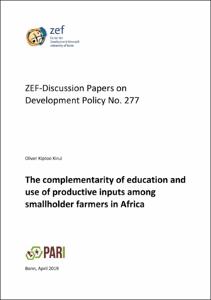The complementarity of education and productive inputs among smallholder farmers in Africa

The complementarity of education and productive inputs among smallholder farmers in Africa

| dc.contributor.author | Kirui, Oliver Kiptoo | |
| dc.date.accessioned | 2022-06-02T07:28:15Z | |
| dc.date.available | 2022-06-02T07:28:15Z | |
| dc.date.issued | 04.2019 | |
| dc.identifier.uri | https://hdl.handle.net/20.500.11811/9839 | |
| dc.description.abstract | This study seeks to assess the complementarity of education and use of use of agricultural inputs–improved seeds, fertilizers, access to credit facilities (loans)), and the incremental effects of education on intermediate to longer-term economic outcomes (consumption expenditure and poverty) among smallholder farmers in four countries in SSA Africa (Ethiopia, Malawi, Nigeria and Tanzania). We apply a multinomial endogenous treatment model with education as our ‘treatment’ variable (variable of interest) with four possible levels (noschooling, primary, secondary, post-secondary). The empirical model jointly estimates ‘treatment’ and selection effects and by this corrects for selection into one or the other education level. Using nationally representative LSMS panel data allows us to comprehensively assess the impact of education on the outcome variables. Overall results suggest that higher education (secondary and post-secondary level) significantly increases the use of improved seed varieties and fertilizers, access to credit services, and per capita consumption expenditure and consequently reduces household poverty. Specifically, findings suggests that post primary education (secondary and post-secondary levels) is by far the most important factor in use of productive inputs than mere introductory literacy and primary learning. For instance, having completed post-secondary education – compared to secondary level of education – increases access to credit services by 49% in Ethiopia, 41% in Nigeria and a whopping 126% in Tanzania. Similarly, completing secondary level of education (compared to primary level) would increase log per capita consumption expenditure by 14% in Ethiopia, 22% Malawi, 9% in Nigeria and 21% in Tanzania but completing tertiary level would further increase household per capita consumption expenditure by about 14% in Ethiopia, 20% in Malawi, 15% in Nigeria, and 45% in Tanzania. These findings augment the conclusion that schooling have positive impacts for the farmers and their households’ well-being. Our findings are of policy relevance to most SSA countries currently grappling with rising urbanization, high youth unemployment, and acute skills shortage. | en |
| dc.format.extent | 51 | |
| dc.language.iso | eng | |
| dc.relation.ispartofseries | ZEF Discussion Papers on Development Policy ; No. 277 | |
| dc.rights | In Copyright | |
| dc.rights.uri | http://rightsstatements.org/vocab/InC/1.0/ | |
| dc.subject | Africa | |
| dc.subject | Skill development | |
| dc.subject | Agricultural production | |
| dc.subject.ddc | 370 Erziehung, Schul- und Bildungswesen | |
| dc.subject.ddc | 500 Naturwissenschaften | |
| dc.subject.ddc | 624 Ingenieurbau und Umwelttechnik | |
| dc.subject.ddc | 630 Landwirtschaft, Veterinärmedizin | |
| dc.title | The complementarity of education and productive inputs among smallholder farmers in Africa | |
| dc.type | Arbeitspapier | |
| dc.publisher.name | Center for Development Research (ZEF) | |
| dc.publisher.location | Bonn | |
| dc.rights.accessRights | openAccess | |
| dc.relation.doi | https://doi.org/10.2139/ssrn.3372123 | |
| ulbbn.pubtype | Zweitveröffentlichung |




